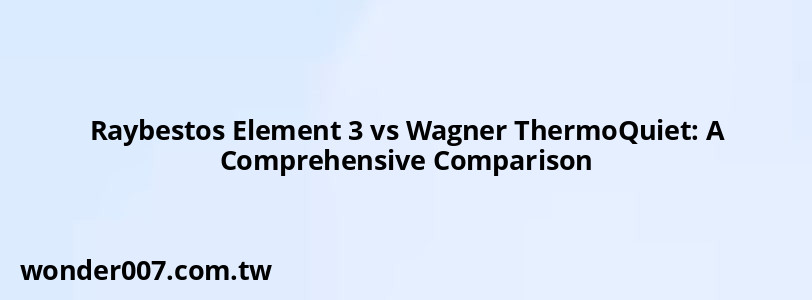Raybestos Element 3 vs Wagner ThermoQuiet: A Comprehensive Comparison

When choosing between Raybestos Element 3 and Wagner ThermoQuiet brake pads, consumers often seek information on performance, durability, and noise levels. This guide aims to provide a detailed comparison to help you make an informed decision.
Overview of Brake Pads
Both Raybestos and Wagner are reputable brands in the automotive industry, known for their quality brake pads. The Raybestos Element 3 features Enhanced Hybrid Technology (EHT), which combines ceramic and semi-metallic materials for improved performance. In contrast, Wagner ThermoQuiet pads utilize a unique one-piece design that integrates the friction material with the backing plate to minimize noise and vibration.
Key Features Comparison
| Feature | Raybestos Element 3 | Wagner ThermoQuiet |
|---|---|---|
| Material | Ceramic and Semi-metallic | Ceramic blends with resin base |
| Noise Level | Generally quiet but can vary | Designed for quiet operation |
| Durability | Long-lasting but some fitment issues reported | Durable with good longevity |
| Performance | Excellent stopping power in diverse conditions | Strong performance with reduced brake fade |
| Installation Ease | Easy installation for most vehicles | Simple installation process |
Performance Analysis
The Raybestos Element 3 brake pads are praised for their excellent braking performance across various driving conditions. However, some users have reported issues with fitment and hardware compatibility, leading to concerns about reliability in certain applications.
On the other hand, Wagner ThermoQuiet pads are well-known for their quieter operation due to their advanced design that reduces noise and vibration. They also provide consistent performance and are favored for their durability.
User Experiences
Customer feedback highlights mixed experiences with both brands:
- Raybestos Element 3: While many users appreciate the stopping power and low dust production, some have expressed frustration over fitment issues and occasional noise after installation.
- Wagner ThermoQuiet: Users frequently commend these pads for their quiet performance and longevity. They are often recommended by mechanics for their reliability.
Conclusion
Choosing between Raybestos Element 3 and Wagner ThermoQuiet brake pads depends on your specific needs. If you prioritize a quieter braking experience and proven durability, Wagner ThermoQuiet may be the better option. However, if you seek excellent performance with a hybrid material composition, Raybestos Element 3 could be suitable despite some reported fitment challenges.
FAQs About Raybestos Element 3 vs Wagner ThermoQuiet
- Which brake pad is quieter?
The Wagner ThermoQuiet pads are specifically designed to minimize noise. - Are Raybestos Element 3 pads durable?
They are generally durable but have had reports of fitment issues. - What material is used in each pad?
Raybestos uses a combination of ceramic and semi-metallic materials, while Wagner uses ceramic blends.
Related Posts
-
Ford E350 Vacuum Check Valve Location: A Comprehensive Guide
30-01-2025 • 139 views -
2014 Ford Fusion Low Pressure Fuel Sensor: A Comprehensive Guide
28-01-2025 • 172 views -
Chevy Truck Steering Column Diagram: A Comprehensive Guide
28-01-2025 • 155 views -
Hyundai Santa Fe Remote Start: A Comprehensive Guide for 2013 Models
28-01-2025 • 200 views -
Fixing Power Steering Assist Fault: A Comprehensive Guide
28-01-2025 • 145 views
Latest Posts
-
2015 Chevy Traverse AC Recharge Port Location
01-02-2025 • 354 views -
Are O2 Sensors Covered Under Warranty
01-02-2025 • 326 views -
How To Turn Off Paddle Shifters Mercedes
01-02-2025 • 320 views -
Power Steering Fluid Leak On Passenger Side
01-02-2025 • 408 views -
Rear Brake Caliper Piston Won't Compress
01-02-2025 • 300 views
Popular Posts
-
Power Steering and ABS Light On: Causes and Solutions
27-01-2025 • 597 views -
EPC Warning Light: What It Means for Your Vehicle
27-01-2025 • 577 views -
EPC Light: Understanding Causes and Solutions
26-01-2025 • 1016 views -
V12 Engine Costs: What You Need to Know
26-01-2025 • 610 views -
Hino Warning Lights: Understanding Dashboard Alerts
26-01-2025 • 592 views
